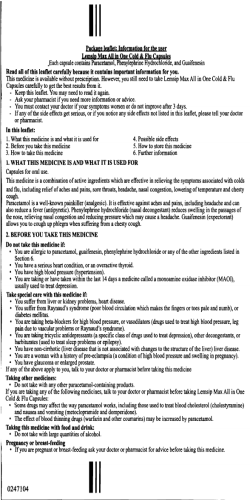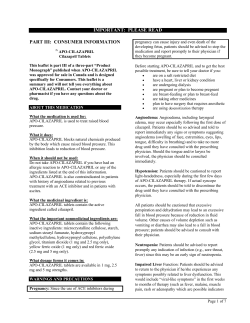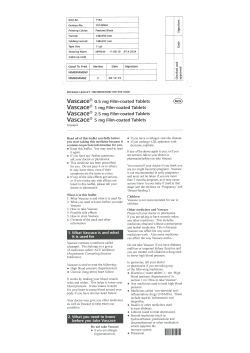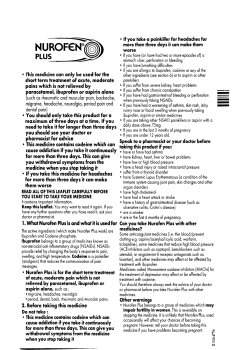
Imodium capsules Loperamide hydrochloride
PACKAGE LEAFLET: INFORMATION FOR THE USER Imodium® capsules Loperamide hydrochloride Imodium is a registered trademark Read all of this leaflet carefully before you start using this medicine. Keep this leaflet. You may need to read it again If you have any further questions, ask your doctor or pharmacist This medicine has been prescribed for you. Do not pass it on to others. It may harm them, even if their symptoms are the same as yours If you get side effects and they become serious or if you notice any side effects not listed in this leaflet, please tell your doctor or pharmacist In this leaflet 1 What Imodium capsules are and what they are used for 2 Before you use Imodium capsules 3 How to use Imodium capsules 4 Possible side effects 5 How to store Imodium capsules 6 Further information 1 What Imodium capsules are and what they are used for The name of your medicine is Imodium capsules. What Imodium capsules are used for Imodium capsules are used: To treat sudden short-lived (acute) attacks of diarrhoea in adults and children over 8 years of age To treat long-lasting (chronic) diarrhoea in adults How Imodium capsules work Imodium capsules contain a medicine called loperamide hydrochloride. It belongs to a group of medicines which helps reduce diarrhoea by slowing down an overactive bowel. It also helps the body to absorb more water and salts from the bowel. 2 Before you use Imodium capsules Do not use Imodium capsules if: You are allergic to anything in Imodium capsules (listed in section 6 below) You have severe diarrhoea after taking antibiotics You are having a flare up of ulcerative colitis You are constipated or your stomach appears swollen (particularly in children with severe dehydration) Your child is less than 8 years old Imodium syrup can be used for children over 4 years old -1– Do not use this medicine if any of the above applies to you. If you are not sure, talk to your doctor or pharmacist before using Imodium capsules. Take special care with Imodium capsules Check with your doctor before using Imodium capsules if: You have acute dysentery, the symptoms of which may include blood in your stools and a high temperature. You will also need to be given other medicines to treat this You suffer from liver problems You have AIDS and your stomach becomes swollen. Stop taking the capsules immediately and contact your doctor You may still be able to use Imodium capsules, but you should discuss this with your doctor first. Replacing fluid and salts Imodium capsules only treat the symptoms of diarrhoea. When you have diarrhoea, your body loses large amounts of fluid and salts. You should therefore replace this lost fluid by drinking more than normal. This is especially important for children. Your doctor may also give you a special powder containing sugar and salts (known as oral rehydration therapy) to help your body replace the fluid and salts lost during diarrhoea. Taking other medicines Please tell your doctor or pharmacist if you are taking or have recently taken any other medicines. This includes medicines that you buy without a prescription or herbal medicines. In particular, tell your doctor or pharmacist if you are taking any of the following: ritonavir (used to treat HIV) quinidine (used to treat abnormal heart rhythms or malaria) oral desmopressin (used to treat excessive urination). Pregnancy and breast-feeding Tell your doctor before taking Imodium capsules if you are pregnant, think you may be pregnant or might become pregnant. Do not take this medicine if you are breast-feeding as small amounts may get into your milk. Talk to your doctor about a suitable treatment. Ask your doctor or pharmacist for advice before taking any medicine if you are pregnant or breast-feeding. Driving or using machines This medicine may make you feel dizzy, tired or sleepy. If affected do not drive or operate machinery. Important information about some of the ingredients of Imodium capsules Imodium capsules contain lactose. If your doctor has told you that you are intolerant of some sugars, discuss it with them before taking this medicine. 3 How to use Imodium capsules Always use Imodium capsules exactly as your doctor has told you. You should check with your doctor or pharmacist if you are not sure. -2– Taking this medicine Take this medicine by mouth Swallow the correct number of capsules whole with a drink of water How much to take The dose of Imodium capsules that you will need will depend on whether your diarrhoea is a sudden attack (acute) or a long-lasting condition (chronic). Short-lived (acute) diarrhoea Adults Take 2 capsules straight away From then on take 1 capsule after each episode of diarrhoea You can take this medicine for up to 5 days Never take more than 8 capsules in any 24 hour period Children aged 9-12 years old Take 1 capsule 4 times a day until diarrhoea is controlled You can take this medicine for up to 5 days Children under 8 years old Imodium capsules are not recommended for children under 8 years old Imodium syrup can be used for children over 4 years old If you are not getting better within 2 days of taking your first dose of Imodium capsules, go back to your doctor. He or she may want to examine you to check on why you have diarrhoea. Long-lasting (chronic) diarrhoea Adults Your doctor will tell you how many Imodium capsules to take. This will depend on how serious your condition is You will probably start with a dose of between 2 and 4 capsules spread out over a day Your doctor will find the dose that suits you best. He or she may then suggest you take the capsules twice a day Never take more than 8 capsules in any 24 hour period Children Imodium capsules are not recommended for long-lasting (chronic) diarrhoea. If you forget to take Imodium capsules You should only take this medicine as required following the dosage instructions above carefully If you forget to take a dose, take a dose after the next loose stool (bowel movement) Do not take a double dose to make up for a forgotten dose -3– If you use more Imodium capsules than you should If you take more Imodium capsules than you were told to or if someone else has taken any, talk to a doctor or go to the nearest hospital casualty department straight away. If you have any further questions on the use of this product, ask your doctor or pharmacist. 4 Possible side effects Like all medicines, Imodium capsules can cause side effects, although not everybody gets them. Stop using Imodium capsules and tell your doctor straight away if you notice or suspect any of the following. You may need urgent medical treatment. Very rare (affects less than 1 in 10,000 people) Sudden swelling of the face, lips or throat. Hives (also known as nettle rash or urticaria), severe irritation, reddening or blistering of your skin. These may be signs of a severe allergic reaction Blistering of your skin, mouth, eyes and genitals Stomach pain or severe swollen stomach Severe constipation Tell your doctor if you notice any of the following side effects while using Imodium capsules: Very rare (affects less than 1 in 10,000 people) Itchy skin and rash Difficulty passing water Other side effects which may occur: Very rare (affects less than 1 in 10,000 people) Feeling sick (nausea), being sick (vomiting), indigestion (dyspepsia) Wind Feeling drowsy or dizzy Other side effects that may be due to the medicine or diarrhoea: Feeling tired Dry mouth If any of the side effects gets serious, or if you notice any other side effects not listed in this leaflet, please tell your doctor or pharmacist. 5 How to store Imodium capsules Keep out of the reach and sight of children. Do not use Imodium capsules after the expiry date which is stated on the label. The expiry date refers to the last day of that month. Medicines should not be disposed of via wastewater or household waste. These measures will help protect the environment. Return any leftover Imodium capsules to your pharmacist. -4– 6 Further information The active substance in Imodium capsules is loperamide hydrochloride. Each Imodium capsule contains 2 mg of loperamide hydrochloride. The other ingredients are lactose, maize starch, talc and magnesium stearate. The capsule itself is made up of titanium dioxide (E171), iron oxides (E172), indigo carmine (E132), erythrosine (E127) and gelatin. What Imodium capsules look like and contents of the pack Imodium capsules are green/grey capsules marked 'Imodium' and 'JANSSEN'. They are available in blister packs of 30 capsules or tubs of 250 capsules (for the pharmacist). The product licence is held by: JANSSEN-CILAG LTD, 50-100 Holmers Farm Way, High Wycombe, Buckinghamshire HP12 4EG, UK Imodium capsules are made by: Janssen Pharmaceutica NV, Turnhoutseweg 30, B-2340 Beerse, Belgium OR Janssen-Cilag SA, Campus de Maigremont, 27100 Val de Reuil, France OR McGregor Cory Ltd, Middleton Close, Banbury, Oxfordshire OX 16 4RS, UK For information in large print, tape, CD or Braille, telephone 0800 7318450. This leaflet was last approved in July 2010. -5–
© Copyright 2026












